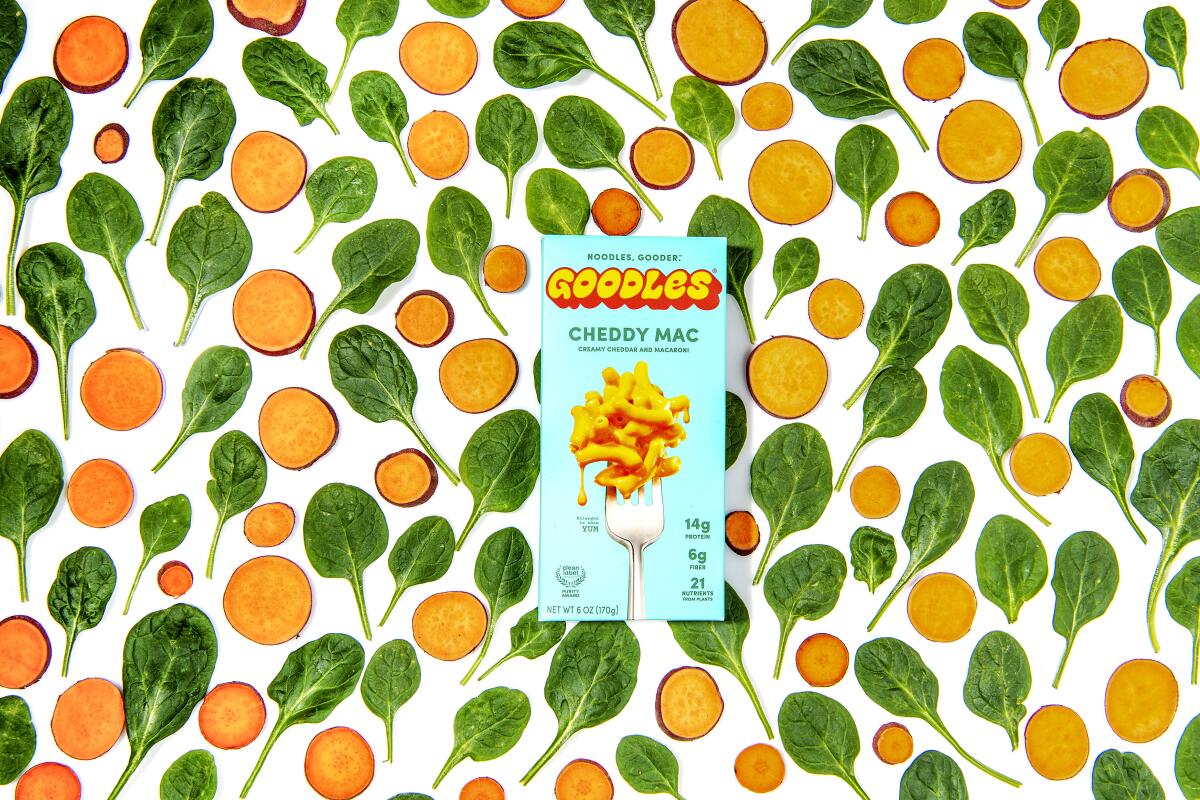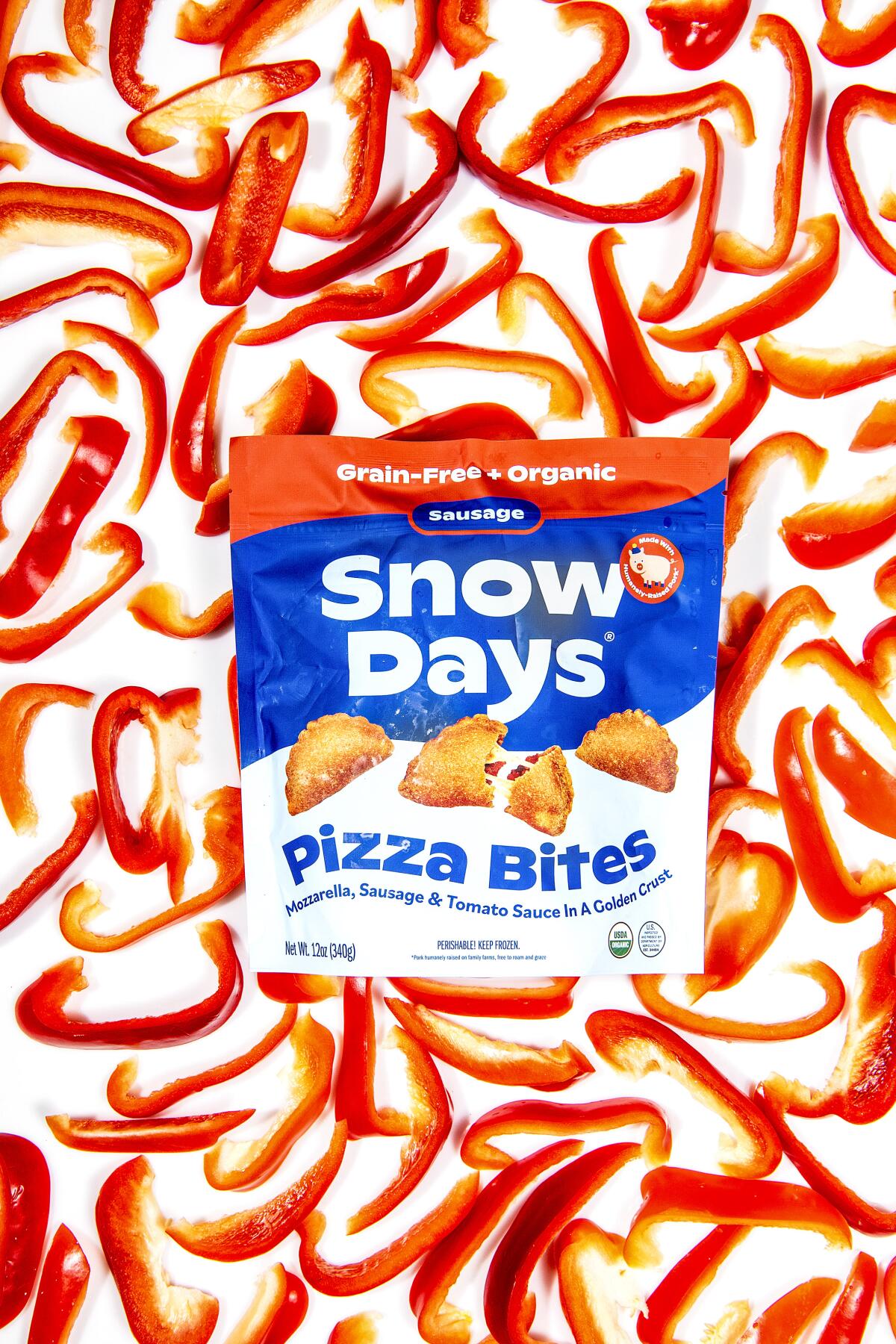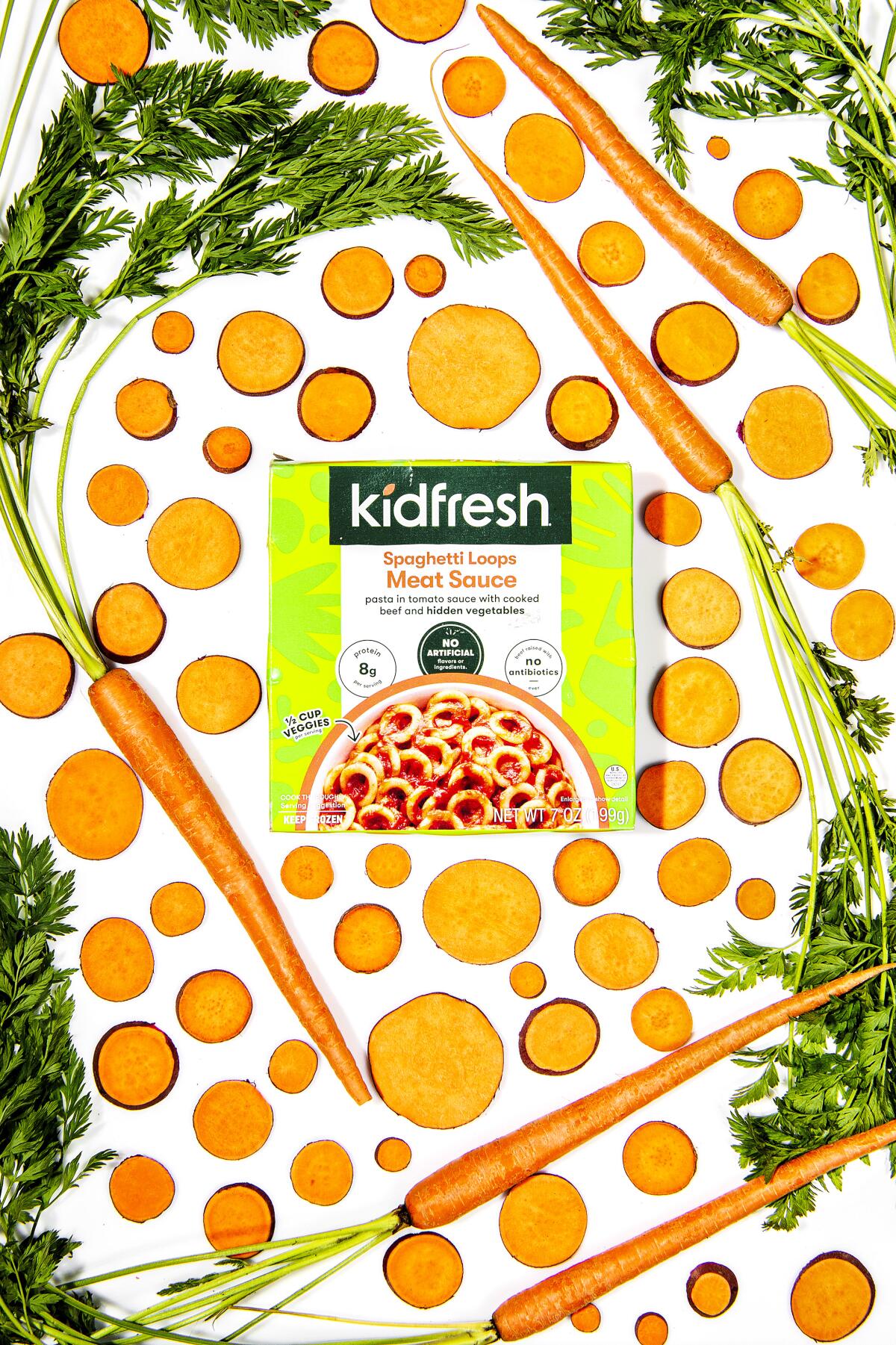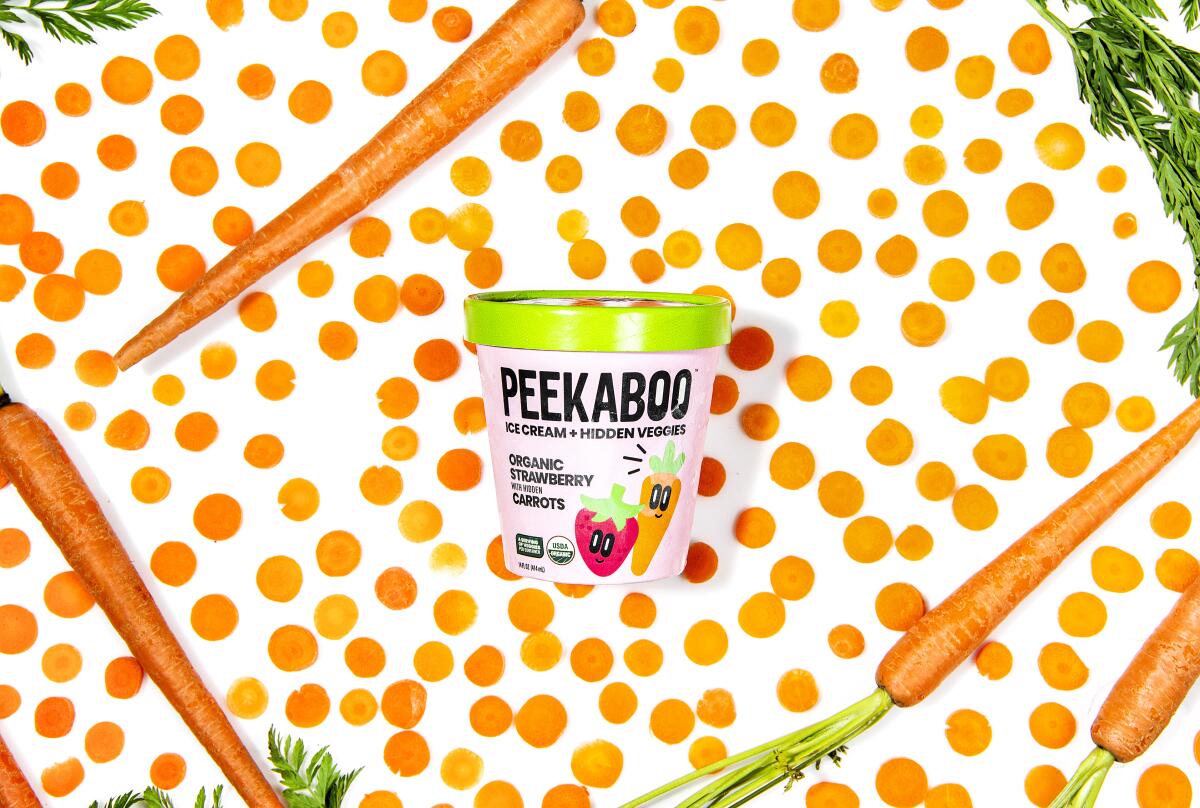Apparently some of us DO need hidden veggies cheerily packaged in comfort foods

- Share via
On Nov. 1, 2021, Gal Gadot brushed her hair back into a low ponytail, donned a seafoam-green hoodie and addressed her 70 million-plus Instagram followers head on.
“Hey guys,” she said, into a self-facing camera. “I have a little secret I want to share with you.
“In fact, it’s not so little,” she teased. “It’s huge. Huge. Ready?” Then, she airplaned a fork full of neon orange macaroni noodles into the frame, took a bite and said no more.
Could it be a Wonder Woman spinoff? “Red Notice 2”?
Two weeks later, Gadot reappeared for the big reveal: The “huge secret” in question was her new line of boxed macaroni and cheese with hidden vegetables, called Goodles.
It is the latest entry in the herd of cheerily packaged comfort foods aimed at adults who — apparently — would like to be coddled into eating their veggies.
In addition to Goodles (ingredients include broccoli, kale and pumpkin), there are frozen pizza rolls packed with undetectable bits of carrot, spinach, sweet potato and bell pepper. They arrive in blue bags designed to evoke memories of the burbling, saucy snacks that burned the roof of your mouth at a sleepover in 1997. There is microwavable apple spice oatmeal, peppered with freeze-dried cauliflower. There are smoky barbecue chips in crinkly bags, puffed up just like the ones next to the deli sandwich counter, made from celery and kale pulp. And there are other takes on nutritionally enhanced mac, like Camp’s Classic Cheddar Mac ’n’ Cheese, made in part from zucchini, corn, spinach and maitake mushroom. Sticker prices tend to hover several dollars higher per item than their veg-free counterparts. Goodles, which is currently available only direct-to-consumer, comes to about $6 a box with shipping.

The idea of concealing a vegetable in a meal has, of course, been around since the first toddler learned to wail at a plate of limp broccoli. And there have been attempts to coax adults to join in along the way, such as Jessica Seinfeld’s 2010 cookbook “Double Delicious!” geared toward home cooks seeking guidance for slipping blitzed produce into family meals. (“Jerry’s Cinnamon Buns” call for a half-cup of carrot puree in the dough and a quarter-cup of cauliflower puree in the icing.)
Then came a new wave of packaged hidden-veggie products for kids. Some of them had merry little smiling faces and cartoon carrots on their boxes, with bold lettering that promised nourishment little ones would actually enjoy. Kidfresh founder Matt Cohen launched a line of veg-filled mac ’n’ cheese, meatballs and knockoff Spaghetti-O’s in 2010 after becoming frustrated with limited options for his own children. By the end of year one, Cohen estimates the products were in 50 stores. Today, Kidfresh is on the shelves of more than 10,000 stores.
Jessica Levinson, who runs a frozen yogurt shop in Surfside, Fla., had a similar eureka moment when her oldest child began to refuse anything green. Levinson went to market in 2019 with five flavors of Peekaboo Hidden Veggie Ice Cream, like vanilla with zucchini and mint chip with spinach. On the carton of her chocolate flavor, a life-size stalk of cauliflower with oversized eyeballs seems to be nestling into the shoulder of a friendly candy bar.
Soon, adults began to pick up their spoons too.
“I did feel kind of funny buying kids’ stuff at the grocery store,” says Jane Hardy, a recipe developer and food influencer with 190,000 Instagram followers. She discovered Kidfresh Wagon Wheels macaroni ’n’ cheese in her local freezer aisle well before her first baby was born, and she loved the idea of a serving of carrots along with the cheesy plain pasta she often craves.

The adult-focused startups were, apparently, watching from the next aisle — and they got to work quickly.
“We had debates about whether this should be a kid brand. But really it’s aimed at the child inside mom and dad,” says Brian Evangelista, who runs Snow Days — the hidden-veggie pizza bites — for consumer product incubator HumanCo. “We were looking at the older millennials who rode that pizza bite wave in the ’90s.”
Snow Days — which has its own celebrity mascot in the form of investor and creative director Scarlett Johansson — launched in March 2021. A glowing writeup in Bon Appetit proclaiming the “ingredient list ... reads more like a salad” followed shortly after launch.
Amanda Natividad, a 36-year old marketer who lives in Los Angeles and consumes the pizza bites regularly, says she ate Totino’s Pizza Rolls “all the time” growing up. The first thing that appealed to her about Snow Days was the vegetal ingredient list. “I do have one kid,” she says. “But the pizza bites are for me.”
“Consumer interest in healthy food is not only high, it’s one of the most important factors driving their purchase decisions. Eighty-six percent of consumers surveyed for our recent food paper told us ‘personal health and wellness’ was important or very important in choosing the food they buy,” says Barb Renner, the U.S. consumer products leader for Deloitte. “Healthy doesn’t mean consumers just want to munch on raw carrots and kale. They want tasty, convenient meals and, with all we’ve been through, a little comfort.”

The Goodles founding team — which, including Gadot, is five strong, and is headed by Jen Zeszut, who not so incidentally spent the prior few years as CEO of a baby food company — joined forces over Zoom during the pandemic to craft their own contribution.
The result? Noodles that are Frankensteined together from regular wheat flour, chickpea protein and “nutrients from” broccoli, spinach, kale, pumpkin, sweet potato and mushroom. The noodles rattle around inside a cardboard box that looks like classic Kraft got its ride pimped by the skater kids from Rocket Power, alongside a packet of full-dairy dehydrated cheddar cheese sauce that, when all is said and mixed, tastes like its forefather. (When asked about how the vegetables were integrated, the founding team spokespeople demurred.)
Gadot says she remembers when she was a little girl in Israel and her aunt and uncle used to bring over bags of American mac ’n’ cheese as a gift. “I’d always been frustrated that I wasn’t able to find a more nutritious mac ‘n’ cheese option,” she says. “Which sparked my interest … to incorporate vegetables, protein and fiber.”
After launching late last year, Goodles sold out in weeks. Its parent company, Gooder Foods, Inc., has raised $6.4 million to date.
The road from nostalgia play to sales boon seems to have been paved at least in part by timing. Many of us have spent the last two years locked indoors, freaking out, incredibly worried about our health. The confluence created a landing pad for prepackaged comfort foods that signal vague promises of wellbeing.
“Even as a nutritionist, I’m craving comfort food,” says Elissa Goodman, who runs a holistic practice in Los Angeles. “And my clients are like, ‘I don’t have any brain power or energy to think about cutting up vegetables and making a salad.’”
“Healthy junk food” sold well over the last two years, says Jessica Young, who in 2019 founded Bubble, an online marketplace for healthy snacks and pantry staples. “The consumer today is much more cognizant of what’s going into their body,” she adds, which is why they’re loading up their carts with cookies that are sweetened with apple juice and bags of chips made from celery pulp. When Bubble first launched, there were about 40 brands selling food items on the platform. Today, Young says, there are nearly 600.
As for the actual health benefits of hidden-veggie comfort foods, nutritionists admit — somewhat begrudgingly — that they do exist, to an extent.
If you’re deciding between a salad and a hidden-veggie pizza bite, obviously the former contains more nutritional value. But if you’re dead set on a pizza bite, any amount of vegetables is better than nothing, says Goodman.
Gadot purports to eat Goodles twice a week.
Recently, she posted part of a behind-the-scenes video of her glam squad in action on Instagram. As a man coerced her hair into oversized curlers and a woman worked on Gadot’s eyebrows, the actor ate forkfuls of Goodles.
“Just like the old days,” said the woman, and Gadot waggled those famous eyebrows and grinned in confirmation.
More to Read
Eat your way across L.A.
Get our weekly Tasting Notes newsletter for reviews, news and more.
You may occasionally receive promotional content from the Los Angeles Times.










